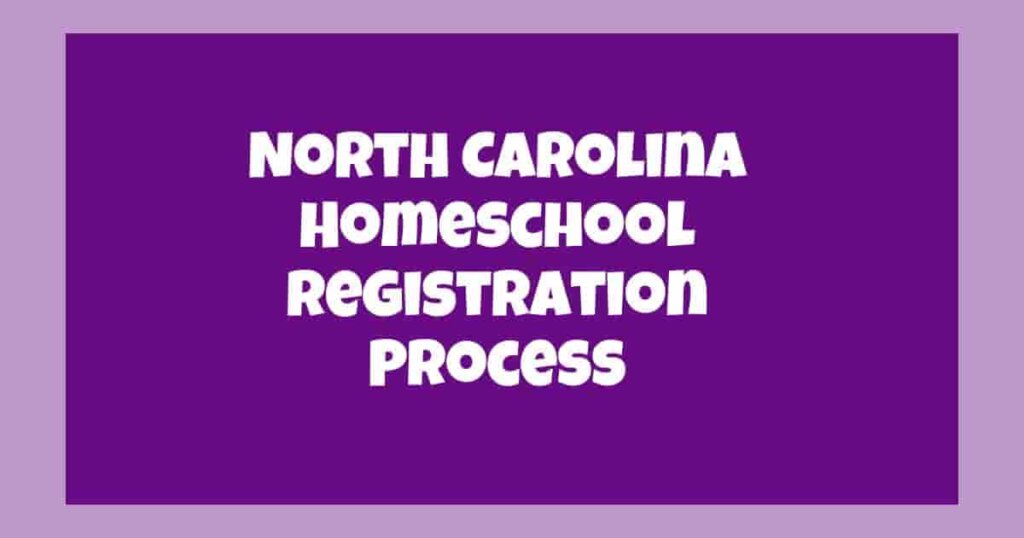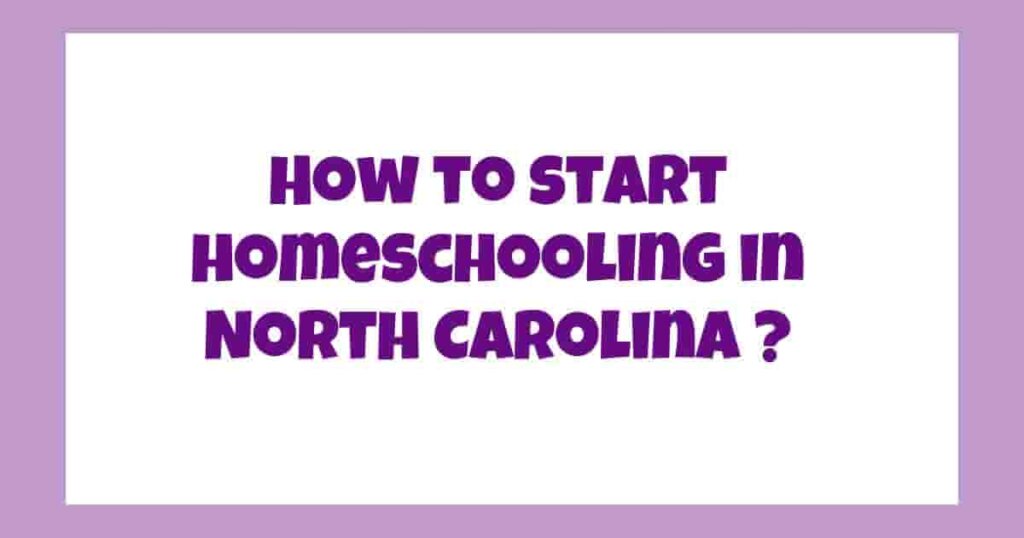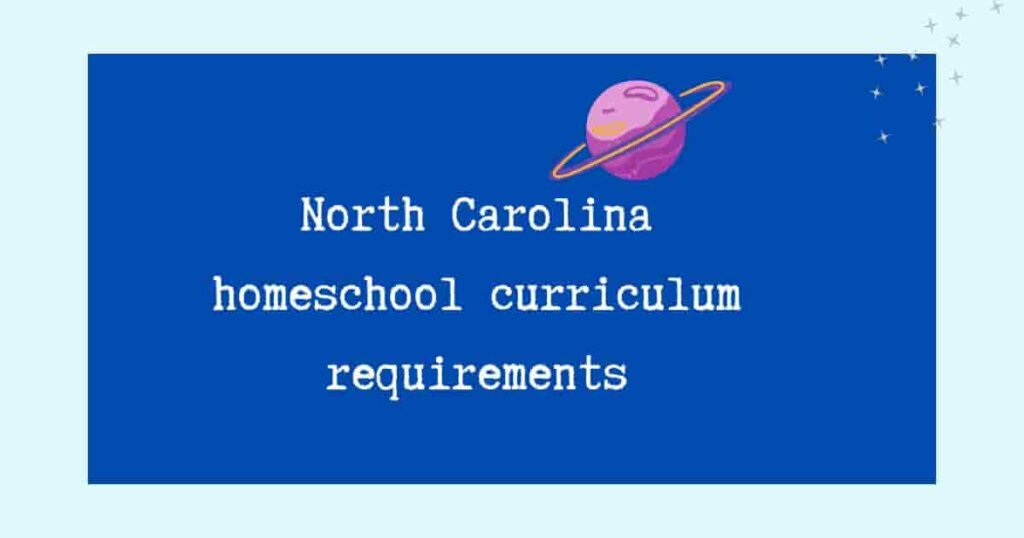Do you want to learn how to start homeschooling in North Carolina? This article will help you develop your idea.
However, homeschooling is an excellent option for families in North Carolina. North Carolina has provided a favorable environment that makes it easy to embark on this fulfilling exercise. Organizing home learning for a child based on their individuality in a few simple ways is possible.
This brief guide will help you determine how to start homeschooling in North Carolina.
This guide teaches you about the best homeschool programs in North Carolina, the homeschool registration process, homeschool laws, homeschool websites, curriculum requirements, accredited homeschool programs, how to homeschool in North Carolina for free, notice of intent to homeschool, approved homeschool curriculum, and some common FAQs on how to start homeschooling in North Carolina.
Let’s get our essential topics related to how to start homeschooling in North Carolina.
The best homeschool programs in North Carolina
Before starting to learn how to start homeschooling in North Carolina, you should know about the best homeschool programs in the state.
Here are some of the best homeschool programs in North Carolina for you:
- North Carolina Virtual Academy (NCVA): It is a K-12 school that offers instructional materials, daily live interaction, and teacher facilitation free of charge.
- North Carolina Cyber Academy (NCCA): This is a free online school for K-12 students. It offers flexible classes and many courses, including AP classes.
- Time4Learning: This is a cheap service that provides child-centered instruction with computerized math, language, science, and social studies lessons for children from pre-kindergarten to high school.
- Bridgeway Academy: It is an online school that offers flexible education for homeschoolers and academic credit courses accepted by many institutions.
- The Oaks Private School: This is a homeschooling program for Christian schools that allows the child to learn according to their pace since they provide individual curriculum and will enable the child to be supported and accredited if needed.
- Abeka Academy: This one targets Christian education and offers video instruction, quizzes, and instruction for every grade, starting in kindergarten and ending in the twelfth grade.
- Classical Conversations: A Christian homeschool association that provides daily group education classes and home school for classical learning.
The above programs provide different cost-effective, quality, and flexible homeschooling programs in North Carolina, which may be helpful to you as you learn how to start homeschooling in North Carolina.
Discover also How You Can Get Paid to Homeschool in California
North Carolina Homeschool Registration Process

Learning the registration process is very important if you want to know how to start homeschooling in North Carolina. So, to register for homeschooling in North Carolina, follow the process:
- Sign up using the North Carolina Division of Non-Public Education (DNPE) website.
- File a NOI when one wishes to start homeschooling. This form is downloadable from the DNPE site.
- Provide points about your homeschool, such as the name of your homeschool, your child’s grade, and so on.
- See that the head of the home has at least a high school education or equivalent.
- This file should contain attendance records, immunizations, and yearly standardized tests.
After approval, your homeschool will be recognized by the state of your residence.
Read also the top States that pay for homeschooling in the USA.
North Carolina homeschool laws
Learning the homeschool laws of North Carolina is very important as you will understand how to start homeschooling in North Carolina. Therefore, in North Carolina, parents must follow specific laws to homeschool their children:
1. File a Notice of Intent: Send a Notice of Intent to the North Carolina Division of Non-Public Education (DNPE) in North Carolina. Your homeschool’s name and address should be included.
2. Educational Requirement: The person teaching must possess at least a high school education qualification or the equivalent.
3. Keep Attendance and Immunization Records: Keep an up-to-date record of all the children’s attendance and immunization records.
4. Annual Standardized Testing: Every student must complete a test with the same format every year. It is recommended that test records be retained for at least one year.
5. Operate on a Regular Schedule: Your homeschool should operate on a timetable for at least nine months a year.
Adherence to these guidelines follows the North Carolina homeschool laws to the letter.
Read to Unveil the Psychological Effects of Homeschooling for your child.
How to start homeschooling in North Carolina?
If you know about the homeschool laws, registration process, and the best homeschool programs in North Carolina, it will be easy for you to start homeschooling in North Carolina.

Homeschooling in North Carolina is easy, but specific procedures and regulations must be followed. Here’s a clear breakdown of how to start homeschooling in North Carolina:
1. Understand the Legal Requirements
North Carolina Law mandates specific procedures that parents willing to start homeschooling must follow. The process involves filing a notice of intent, keeping attendance records, and VI forming a testing procedure. This way, you maintain compliance with the different rules in the field.
2. File a Notice of Intent
The first legal procedure is to fill out a “Notice of Intent to Homeschool” with the North Carolina Department of Non-Public Education (DNPE). You can even get this done online from their website. List all the students aged 7 to 16 years you intend to homeschool, the name and address of your homeschool, and a copy of your high school diploma at the very least. This notice also officially lays down homeschooling for your child.
3. Select a Homeschool Curriculum
North Carolina law permits you to choose your curriculum, ensuring that you choose a curriculum that suits the child. Different resources are available, such as conventional textbooks, online programs, or a combination. You are always in control, meaning you can regulate the learning process in your child’s best interest.
4. Follow Attendance and Record-Keeping Requirements
Every home school in North Carolina should keep standard records, including an attendance record. Keep these records for the entire calendar year because DNPE may review all files. Provide the primary organization of attendance and grade records so that if there is a question of homeschooling compliance, it is simple to show.
5. Guarantee an Annual Standardized Test
North Carolina requires a homeschooled student to sit for an annual and another standardized test. English grammar, reading, spelling, and mathematics are the main areas that require testing. You can decide which test you wish to give, but the results should be kept in writing for at least a year. This test monitors your child and/or class and ensures it meets the state’s necessary standards.
6. Use Local Homeschooling Resources and Support Groups
Come with other homeschooling parents in North Carolina with your children for support and references. The many groups available also organize meetups and field trips and provide various common resources. Such connections assist both the parents and the students to engage in some social activities, exchange various learning experiences, not to mention the encouragement that the parents offer to motivate their students. To join a group, you may participate through social media or a homeschool association to locate families nearby.
7. Plan and Set Your Daily Routine
From experience, one could set a daily timetable that is best suited for both the parent and the child with special needs. One of the benefits is the freedom of homeschooling, which means you can schedule lessons according to your family’s schedule. Here, you can find out if you are going to plan a strict timetable or if you are going to make a free schedule. These are rocked to ensure that homeschooling ground runs well and everyone does what should be done.
8. Track Progress and Adjust as Needed
Monitor your child’s achievement frequently and change his curriculum or teachers if necessary. Parents homeschool their children so they can reap the advantage of flexibility in learning. On the other hand, if your child seems to perform well in a certain subject area, set higher standards. If they find the subject difficult, then spend more time on it.
9. Consider Extracurricular Activities
Doing home school does not equal doing away with extra activities. Homeschooling can enroll homeschooled students to participate in an activity such as sports at sports teams, art classes, or whatever activity is offered at the local community centers in North Carolina. These encourage your child’s social participation and skills as well.
10. Renew and Update as Needed
You can continue to follow North Carolina’s homeschool requirements each year. However, if your homeschooled child’s address changes, you don’t have to resubmit a new notice of intent. However, you must keep records of your child’s attendance and administer annual tests.
The guidelines below will assist any parent in starting homeschooling in North Carolina. Homeschooling is a pleasant process for you and your child, as your child receives an individualized, individually-paced education.
View also the best online homeschool programs free for your child’s learning.
North Carolina homeschool website
The North Carolina Division of Non-Public Education (NCDNPE) has a website for homeschooling in North Carolina. Its site contains information on policies, regulations, rules, and recommendations concerning homeschooling in the state. I suggest following the website to develop your idea about how to start homeschooling in North Carolina.
Website: www.ncadmin.nc.gov/about-doa/division-non-public-education
North Carolina homeschool curriculum requirements
After getting an idea about the best homeschool programs, registration process, homeschool laws, and how to start homeschooling in North Carolina, you must realize the homeschool curriculum requirements of North Carolina.

This paper examines the legal rights of homeschooling students within North Carolina and the curricular requirements of homeschooling. That means parents are free to select and plan for the curriculum of their choice for their child. However, the state does expect some basic guidelines to be followed:
- Subjects: Any homeschooling must contain a minimum of a basic education curriculum standard of what is taught in a formal classroom. This can cover most grades, encompassing reading, spelling, grammar, mathematics, and science. These are some of the basic subjects that parents should ensure their kids cover all year.
- School Year: Homeschools should function like any other school, working throughout the year, at least nine months in a year.
- Testing: Homeschool students must take a nationally standardized test each year. The test should measure students’ performance in reading, language, arts, and mathematics. It is also recommended that parents keep these test results on file for one year.
- Attendance and Records: Parents should keep docket records, including attendance and immunization records. These documents must be on hand if the North Carolina Division of Non-Public Education [DNPE] needs to access them.
North Carolina is one of the states that permits parents to choose the teaching method and the type of curriculum to use. Thus, it guarantees students an education that equips them with the basic education needs when they complete their state requirements.
Accredited homeschool programs in North Carolina
I think you have the ideas that I have discussed before. Now, let’s start learning about the accredited homeschool programs in North Carolina as you develop your idea about how to start homeschooling in North Carolina.
There are several types of legally recognized homeschooling in North Carolina that give parents an effective method of homeschooling their children. For example-
- North Carolina Virtual Academy (NCVA): NCVA is an online school for kindergarten through grade twelve students with no tuition fees. It provides teachers with proper certification, well-structured lessons, and a learning program SHARES with North Carolina standards. It is not a purely homeschooling type of school, but it offers total online learning, which can meet homeschooling families’ needs.
- North Carolina Connections Academy: This is another freely offered, fully accredited online school for the public. It supports K-12 students with a curriculum that also entails live sessions, certified teachers, and academic plans. It complies with state requirements, which means that students can freely transfer their credits.
- Bridgeway Academy: Bridgeway is a private homeschooling academy with a K-12 curriculum that offers state-accredited education. They offer all types of curriculum packages with the Internet and Textbooks, and certified teachers can teach at the facility.
- Acellus Academy: Acellus offers an accredited virtual education program for Kindergarten and High School. This highly mobile program lets students establish schedules and provides proper video lectures and assessments.
- Time4Learning: Time4Learning is not officially accredited; however, it offers an accepted curriculum that follows North Carolina standards and is used by many homeschooling families.
These options provide direction, responsibility, and assistance to guarantee quality education for North Carolina homeschool students.
How can you homeschool in North Carolina for free?
Though you have the idea about how to start homeschooling in North Carolina, if you want to homeschool for free in North Carolina, follow these steps:
1. Understand State Requirements: According to North Carolina law, any home school student between the ages of 7 and 16 requires the parent or legal guardian to complete an NOI. The NOI must be submitted on the North Carolina Division of Non-Public Education (DNPE) website.
2. Choose Free Curriculum Resources: Teaching resources available on the Internet are free and cover core topics. Many websites, such as Khan Academy, CK-12, and Easy Peasy All-in-One Homeschool, contain lessons and study materials for Mathematics, Science, English, and History.
3. Utilize Public Libraries: These institutions are famous for the offering of books and other learning materials that are offered free to users. Most libraries also have electronic materials, including famous e-books and audiobooks.
4. Join Homeschool Groups: Get a list of the Homeschool groups and Homeschool Co-op classes in your area to get support, resources and classes. Facebook and Meetup will help you find groups in North Carolina.
5. Follow Attendance and Testing Rules: Keep attendance records and perform written testing each year, as provided by state law in North Carolina. You can also complete them online for free or go to the public library to take them.
6. Stay Updated: Visit the DNPE website often to learn about the current regulations regarding homeschooling in North Carolina.
Homeschooling does not necessarily require spending money to be successful as long as one will make use of free resources and too much organization.
Notice of intent to homeschool in North Carolina
Three things are required if you want to learn how to start homeschooling in North Carolina one’s children; one of them is filing a Notice of Intent to Homeschool. This notice also lets the local school district know your decision. Below are steps that you should follow if intending to file it.
- Prepare the Notice: Write a simple letter. Remember to provide your name, address, and the names and ages of your children. Say that you want to homeschool them.
- Submit the Notice: Mail the notice to your appropriate local school district office. This can be done by post or through email, depending on the district to which the petition is submitted.
- Deadline: Submit it at least one month before you start homeschooling. For those intending to commence in August, it must be filed by July 1.
- Record Keeping: Ensure you have a copy of the notice for your files. It is essential if you’re required to show evidence at some other time in the near or distant future.
- Registration: You are also required to submit the notice and register your homeschool with the Division of Non-Public Education in North Carolina. This stage is most often completed through the Internet.
- Curriculum: Choose the curriculum you plan to utilize. North Carolina is affiliated but does not mandate a curriculum for school; however, basic courses that must be taught include reading, writing, arithmetic, and social studies.
- Annual Assessment: The last time for evaluation is at the end of the year when you need to review your child’s progress. Standardized tests or other types of assessment are still acceptable.
By following these steps, you are observing the homeschooling laws of North Carolina, which are easy to follow.
North Carolina approved homeschool curriculum.
Some requirements include the freedom of parents in North Carolina to choose what curriculum to use at home. The curriculum adopted by parents is flexible about state competitions; any curriculum can be selected. While the state does not prescribe a specific curriculum, this need is met because of a lack of parental choice.
Parents are mandated to register with the North Carolina Division of Non-Public Education before starting homeschooling. To homeschool, they have to file a notification of intent to homeschool. The notice to be published should contain the child’s name and age. Parents who have filed the notice can homeschool as they wait for the regional superintendent’s decision.
Many families use the Abeka, Saxon Math, and Oak Meadow curriculum. Other interesting social media platforms include KA and IXL. This also means that parents can choose different subjects from different providers. This customization helps the child fit into the learning style and ability.
North Carolina enforces the requirement that homeschooling students provide attendance records and submit them each year. This means students in Grades 3, 6, and 9 must sit for standardized tests to evaluate their performance. Parents should also make sure to retain the results on file.
Overall, North Carolina assists homeschooling with different acknowledged programs and curricula. Thus, parents decide what is better for their child and whether education is suitable and efficient.
Last words on How to Start Homeschooling in North Carolina
The process of homeschooling in North Carolina may seem daunting at first, but once you know how to start homeschooling in North Carolina, it is actually very exciting.
Therefore, by meeting the state standards and finding the right curriculum and other support groups for your child, you are on the right track towards your kid’s education. When it comes to homeschooling, you can design a learning program that will suit your child in many ways.
Some essential tips to consider when homeschooling include Going through the process, keeping organized, and appreciating the freedom of homeschooling. Do not panic. Begin with confidence and lay the foundation for children to excel in their self-guided education process.
FAQs on How to Start Homeschooling in North Carolina
How do I start homeschooling my child in NC?
Before starting homeschooling in North Carolina, you must inform your local school district. Select a curriculum that is fitting for your child. Record each student’s attendance, subject taught, and session carried out. Timetable yourself and prepare your home for learning. Enjoy the process!
How can you homeschool in North Carolina (NC) for free?
To homeschool in North Carolina for free, follow these steps: File for homeschool with the North Carolina Division of Non-Public Education. You will need articles, free access to online sources, public libraries, and community services. School at home and find groups to link up with parents who homeschool and exchange resources. Schedule your day and week and design a course of study.
Do you get money for homeschooling in NC?
In North Carolina, parents and guardians are not paid directly for homeschooling. Nonetheless, they can claim some tax credits and could be eligible for taxation on educational expenses. Moreover, some programs fund educational resources or relevant activities, depending on the location and program offered.
How many hours are required for homeschooling in North Carolina?
North Carolina law mandates that homeschooling children must have a minimum daily instruction of four hours. This applies to all learners from the first to the twelfth grade. Parents can also select the subjects and timing. However, the total time spent on instruction should correspond to the educational standards of the particular state for every grade.
What is the homeschooling program in NC?
The homeschooling programs in North Carolina allow parents to homeschool their children. A family institution must send in a notice of intent to the state. They are selected by parents’ curricula and methods of learning. Homeschooling does not exclude students from extracurricular and standardized tests. Getting a Connecticut support group or resource is not a problem since they are available nationwide.
How much is the homeschooling program in NC?
North Carolina homeschooling may be expensive, depending on your selected curriculum and resources. On average, you may go away between 400 and 1500 dollars or more per child per year. Funds for basic curriculum packages for a single student cost between $200 to $400.
Besides curriculum costs, you will need money for books, supplies, extracurricular activities, and educational outings, which run approximately several hundred dollars per year.
Is North Carolina homeschool-friendly?
North Carolina is homeschool-friendly, yes. The state’s laws are conducive to homeschooling. Parents can also select a curriculum of their own. They must inform the state and maintain records of this. Homeschoolers can interact with other children by attending a particular community function or sporting event. All in all, North Carolina supports homeschooling.
Is K12 free in NC?
Yes, education from kindergarten through the twelfth grade is free in North Carolina. Education in public schools does not attract any fees. Students have an option to attend their local public schools for free. We also get cases of charter schools and magnet schools in which the students are not required to pay for their education. However, certain activities, materials, and services may require a family to pay for them.
How much does homeschooling in NC cost?
A critical factor in homeschooling costs in North Carolina is that it differs. Here are the main expenses:
- Registration Fees: To homeschool in the state, you must submit a $50 processing fee to get your homeschool registered.
- Curriculum: Tuition and curriculum can cost anywhere from $100 per year on the low end to $1,000 or more per year, depending on the curriculum used.
- Supplies: You will also need to purchase other items, such as books, paper, and art material, which will cost between $200 and $500 per year.
- Extracurricular Activities: Groups such as sports or some classes may, for instance, cost an additional $50 to $200 per.
- Testing: For standardized testing, you may be charged $30-$100 per individual test.
In general, homeschooling in the state of North Carolina can cost between $500 and $2000 per year. Your actual cost will depend on your choices and available resources.
What are the rules for homeschooling in NC?
Here are the rules for homeschooling in North Carolina:
- Notification
- Qualifications
- School Records
- Annual Testing
- Curriculum
- Reporting
- Compliance
These are measures that will help make homeschooling in North Carolina meet state requirements as may be required.
How do homeschoolers graduate in NC?
In North Carolina, homeschoolers graduate by following these steps:
- Complete High School Requirements
- Maintain Records
- Create a Transcript
- Issue a Diploma
- Optional Testing
- Notify the Local School District
Thus, by following these measures, homeschoolers can graduate from North Carolina.
Disclaimer: This article does not constitute legal advice. Before making any decisions about educating your children, make sure to consult with your local school board and check the official laws of North Carolina.

I am a content writer and English educator with over 10 years of professional experience. With a master’s degree in English Language and Literature, I specialize in creating educational content that is clear, practical, and easy to understand. As the founder of TakeEasily.com, I’m dedicated to helping students, parents, and teachers with valuable learning resources and insightful guides.


2 thoughts on “How to Start Homeschooling in North Carolina: Reliable Tips”